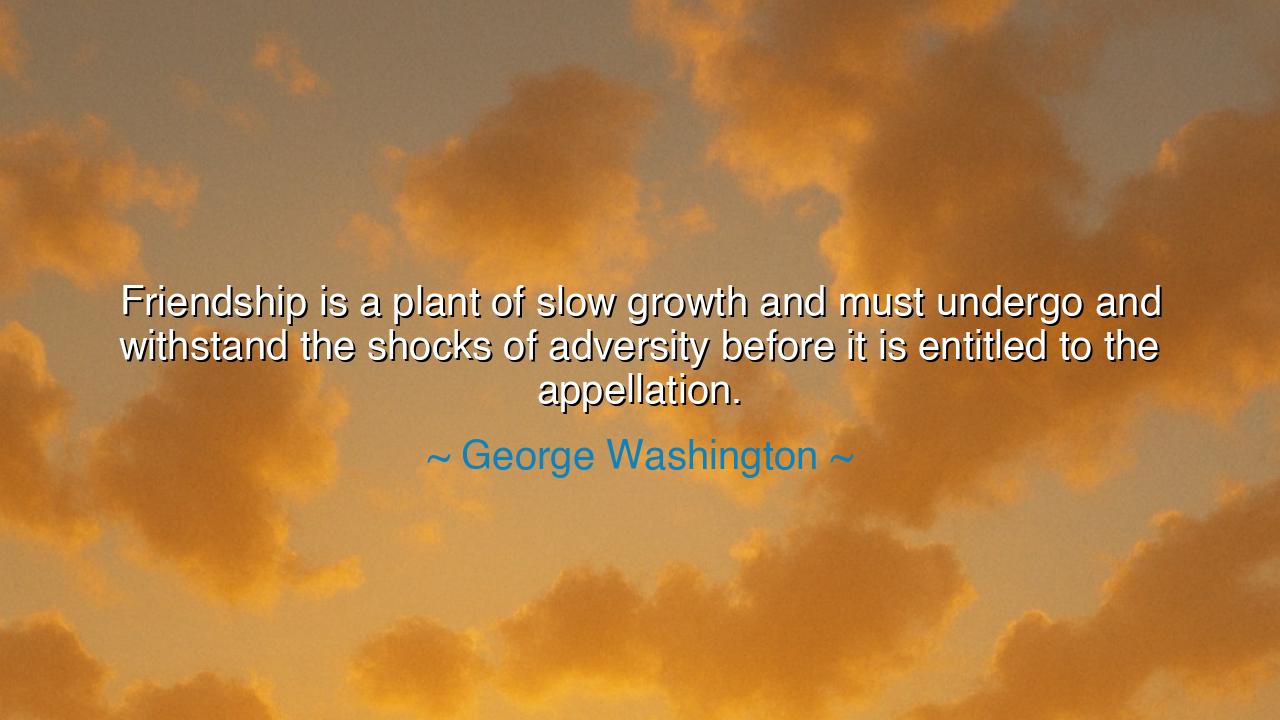
Friendship is a plant of slow growth and must undergo and
Friendship is a plant of slow growth and must undergo and withstand the shocks of adversity before it is entitled to the appellation.






In the noble words of George Washington, the father of a nation and a man tempered by both war and peace, we find a truth as enduring as the mountains he once crossed: “Friendship is a plant of slow growth and must undergo and withstand the shocks of adversity before it is entitled to the appellation.” This saying, born of hard experience, reveals the sacred patience required to forge true bonds between souls. Washington, who had known the treachery of false allies and the steadfastness of true ones, understood that friendship is not a sudden bloom, but a living thing that must be nurtured through seasons of trial. Like an oak rising from a seed, it grows slowly, strengthened by storm and struggle, until it becomes shelter for the spirit.
To grasp the meaning of this wisdom, one must first see friendship as a living being — delicate in its beginnings, resilient in its maturity. In youth, affection often comes quickly, like wildflowers after spring rain — bright, fragrant, and fleeting. Yet the friendships that endure a lifetime are not those born of impulse, but of trust, cultivated through time, labor, and shared experience. Washington reminds us that the title of “friend” is not given lightly; it is earned through endurance. Just as a gardener tends his soil and prunes his tree, so must we cultivate friendship through patience, honesty, and constancy, letting it take root deep within the soul.
The origin of Washington’s insight lies in his own life — one lived amid conflict, duty, and the shifting tides of human loyalty. As commander of the Continental Army and later as President, he knew both the faithfulness of comrades and the bitterness of betrayal. His friendship with the Marquis de Lafayette, for example, stands as one of history’s purest examples of the bond he described. When the young French nobleman crossed the ocean to join the cause of American independence, he did so not for gain, but for conviction. Through the freezing winters of Valley Forge, through hunger and bloodshed, their friendship deepened. Each proved himself to the other not in comfort, but in hardship. Thus, through the “shocks of adversity,” their brotherhood was tested — and found worthy of the name.
In contrast, Washington also experienced the collapse of friendship under strain. During the Revolution, he placed his trust in Charles Lee, a general of great ambition but little loyalty. When the time of battle came, Lee faltered and acted in self-interest, endangering the army. Washington’s disappointment was profound, for he had once considered Lee a trusted ally. It was then that Washington learned — as all must learn — that adversity is the great revealer of character. Where ease conceals, hardship exposes. Friendship, like metal, must be tried in fire to prove its strength.
The ancients spoke similarly of this truth. Cicero, in his dialogue On Friendship, wrote that true friendship can exist only among the virtuous, for it is founded upon integrity and tested through time. The wise Roman knew, as Washington did, that friendship born in comfort often perishes in trial, but that which endures pain grows unbreakable. The shocks of adversity are not merely dangers to friendship — they are its proving ground. Only when two souls stand together against hardship, forgiving one another’s faults, bearing each other’s burdens, and remaining steadfast amid the storms of life, can they be called true friends.
This teaching, though centuries old, is as vital now as in Washington’s day. In a world that moves swiftly and prizes convenience, we are tempted to mistake acquaintance for friendship and kindness for devotion. But friendship, as Washington reminds us, is a slow growth — it requires time, vulnerability, and endurance. It is not measured by words spoken in joy, but by loyalty kept in sorrow. The friend who remains when fortune turns, who speaks truth when flattery is easy, who endures your weakness without abandoning you — that is the one entitled to the sacred name of friend.
And so, dear listener, let this lesson take root within your heart: do not rush the growth of friendship, nor despair when it is tested. Welcome the trials that reveal its strength, and tend it with honesty, patience, and faith. Do not call every pleasant companion a friend; wait until you have walked through storms together, until kindness has proven itself stronger than pride. Then you will know — as Washington knew — that true friendship, once grown, is as enduring as the oak, whose roots reach deep and whose branches give shelter to all who stand beneath its shade.
For in the end, friendship is not a gift of chance but a work of time. It is planted in mutual respect, watered by loyalty, and strengthened by the adversities it survives. To have one true friend in life is to possess a treasure greater than gold, and to be such a friend to another is the highest calling of the human heart. So cherish it, cultivate it, and protect it — for like all sacred things, it is rare, it is fragile, and it is everlasting.






AAdministratorAdministrator
Welcome, honored guests. Please leave a comment, we will respond soon